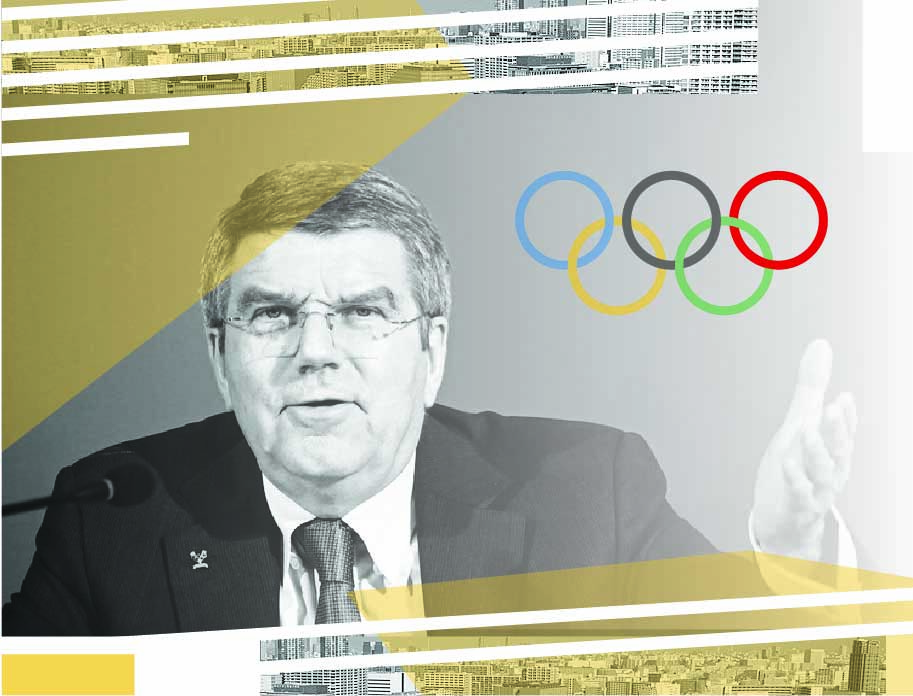
Dr Xavier Ramon
Lecturer at the Department of Communication of Pompeu Fabra University. He serves as co-chair of the Media, Communication & Sport section of the International Association for Media and Communication Research (IAMCR) and as vice-chair of the Communication and Sport Temporary Working Group of the European Communication Research and Education Association (ECREA).
Twitter: @xramonv

Section 2: Media Coverage & Representation
- Twitter conversations on Indian female athletes in Tokyo
- ”Unity in Diversity” – The varying media representations of female Olympic athletes
- How do we truly interpret the Tokyo Olympic ratings?
- Between sexualization and de-sexualization: the representation of female athletes in Tokyo 2020
- Reshaping the Olympics media coverage through innovation
- An Olympic utopia: separating politics and sport. Primary notes after analyzing the opening ceremony media coverage of mainstream Spanish sport newspapers
- What place is this? Tokyo’s made-for-television Olympics
- The paradox of the parade of nations: A South Korean network’s coverage of the opening ceremony at the 2020 Tokyo Olympics
- Tokyo 2021: the TV Olympics
- Why we need to see the “ugly” in women’s sports
- “The gender-equal games” vs “The IOC is failing black women”: narratives of progress and failure of the 2020 Tokyo Olympics
- Ghana: Poor local organizing, and absence of football team dampens interest
- Megan Rapinoe: The scary Bear for many Americans?
- ‘A Games like no other’: The demise of FTA live Olympic sport?
- Temporality of emotionalizing athletes
- Fandom and digital media during the Tokyo 2020 Olympic Games: A Brazilian perspective using @TimeBrasil Twitter data
- Media wins medal for coverage of athletes as people, instead of entertainers
- Media frames and the ‘humanity’ of athletes
- Reporting at a distance. Stricter working conditions and demands on sports journalists during the Olympics
- New Olympic sports: the mediatization of action sports through the Olympic Games 2020 Tokyo
- Simone Biles, journalistic authority, and the ideology of sports news
- Representations of gender in the live broadcast of the Tokyo Olympics
- Americans on ideological left more engaged in Summer Olympics
- Nigeria: Olympic Games a mystery for rural dwellers in Lagos
- National hierarchy in Israeli Olympic discourses
- Equestrian sports in media through hundred Olympic years. A roundtrip from focus to shade and back again?
- Reshaping the superhuman to the super ordinary: The Tokyo Paralympics in Australian broadcasting media
- Is the Paralympic Games a second-class event?
- The fleeting nature of an Olympic meme: Virality and IOC TV rights
- Tokyo 2020: A look through the screen of Brazilian television
- Is the Paralympic Games a second-class event?
- How digital content creators are shaping meanings about world class para-athletes
- How digital content creators are shaping meanings about world class para-athletes
- The male and female sports journalists divide on the Twittersphere during Tokyo 2020
- Super heroes among us: A brief discussion of using the superhero genre to promote Paralympic Games and athletes
- “Everything seemed very complicated”: Journalist experiences of covering the Tokyo 2020 Paralympic Games
- Representing high performance: Brazilian sports journalists and mass communication professionals discuss their philosophies on producing progressive Paralympic coverage
- Representations of gender in media coverage of the Tokyo 2020 Paralympic Games
The Olympic Channel was launched after the Rio 2016 Olympics Closing Ceremony to deliver “a continuous exposure of Olympic sports and athletes beyond the Olympic Games period and help create anticipation while providing opportunities to ‘re-live the experience’ after the Games.” For nearly five years, the Olympic Channel has functioned as a multiplatform destination, featuring its own website and mobile app, as well as specific social media handles on Facebook, Instagram, Twitter, and YouTube. Following the eighth recommendation of the Olympic Agenda 2020+5 (“Grow digital engagement with people”), in May 2021, the Olympic Channel became a section of the Olympics.com website, which currently serves as a comprehensive digital destination for Olympic-themed content and news. In light of this recent development, it is worth investigating the role and output of the Olympic Channel in Tokyo 2020.
A diverse menu aimed at supplementing and enriching viewers’ experience
Before the start of the Games, the Olympic Channel provided global audiences with live coverage of the torch relay, which traveled through 859 municipalities across all 47 prefectures before it arrived at the Olympic Stadium in Tokyo on July 23. Given that during the Olympic Games, live broadcasts of competitions are available from Rights-Holding Broadcasters (RHBs), the Olympic Channel has focused on offering fans a 24/7 stream of distinctive content aimed at supplementing their viewing experience.
During the 17 days of the Games, the Olympic Channel has delivered 408 hours of original content non-stop, drawn from an extensive library of original programming that comprises series and documentaries. This library has experienced remarkable growth since the 2018 Pyeongchang Winter Olympics. In March 2018, the Olympic Channel offered 50 series (with a total of 653 episodes). In Tokyo 2020, the number of original series had increased to 107, featuring a total of 1,062 episodes. Beyond offering a regular programming schedule, a redesigned interface allows users to freely browse content in 11 different categories: #StrongerTogether, Films, Road to Tokyo, Inspired by Friendship, In Pursuit of Excellence, Never Give Up, With Respect, Olympic Memory Lane, Together As One, Around the Globe, and Through the Years.
The Olympic Channel’s original content capitalizes on creative storytelling, in-depth research, and unique perspectives regarding Olympic sports. Through its extensive portfolio, the Olympic Channel offers many opportunities to transcend the nationalized approach and lacking diversity often found in sports media.
Beyond showcasing high-profile sports, the Olympic Channel provides wider visibility to minority sports, which usually remain off the radar in mainstream media, such as rowing, fencing, climbing, table tennis, pentathlon, or weightlifting. Series such as By Her Rules, Shakti: India’s Super Women, or Her Game present empowering stories of female athletes, both focusing on their lives and challenges on and off the field. Alongside different series, the documentary The Invisible Bond lends space to the inspiring achievements of athletes with disabilities. The profiles of refugee sportsmen and sportswomen are also raised through productions such as Camps to Champs and Taking Refuge: Target Tokyo 2020. Overall, by embodying diversity and inclusiveness, the channel is instrumental in advancing the bye-law to Rule 48 of the Olympic Charter, which states that “the media coverage of the Olympic Games should spread and promote the principles and values of Olympism.”
The Olympic Channel’s productions also help relate the past and present. By blending contemporary and archival footage, originals such as Time Machine, Legends Live On, and the recently released The Distance allow audiences to revisit iconic moments in Olympic history, such as Naoko Takahashi’s journey to gold in Sydney 2000. A nod to Japan’s past and present is also accomplished by highlighting the rising Japanese Olympic hopefuls (Heroes of the future), the traditional festivals in the country (Matsuri Japan), and providing a daily behind-the-scenes look at the current Games (Hello Tokyo).
From August 9, the Olympic Channel’s schedules have turned the attention to Tokyo 2020 Replays. In an environment where media events are becoming more personalized, new tabs (Relive Tokyo and Big Splash!) allow users to catch-up with a selection of highlights alongside full coverage of tournaments. Confirming the Olympic Channel’s position as a place “Where the Games Never End”, the day after the Olympic flame extinguished, audiences were able to engage with content from 16 different sports, including taekwondo, shooting, archery, synchronized swimming and equestrian.
Concluding thoughts
As shown in Tokyo 2020, the Olympic Channel plays a distinctive role within the Olympic media ecosystem. This section of the International Olympic Committee (IOC)’s website allows audiences to engage with a broad range of Olympic-themed content that is non-rivalrous with the live, deferred, and on-demand coverage offered by RHBs. By lending additional opportunities for nourishing citizens’ understanding and appreciation of the Olympics, the platform contributes to “strengthening the uniqueness and universality of the Olympic Games,” highlighted as the first recommendation of the Olympic Agenda 2020+5. To sustain and reinforce its position, the Olympic Channel should further create high-quality content to relive the best moments of Tokyo 2020, engage with users in the run-up to the forthcoming events (Beijing 2022, Paris 2024, Milano Cortina 2026, Los Angeles 2028, and Brisbane 2032) and experiment with innovative formats. Additional opportunities to expand the already wider lens of the Olympic Channel include enhancing collaboration with National Organizing Committees (NOCs) and International Federations (IFs).

